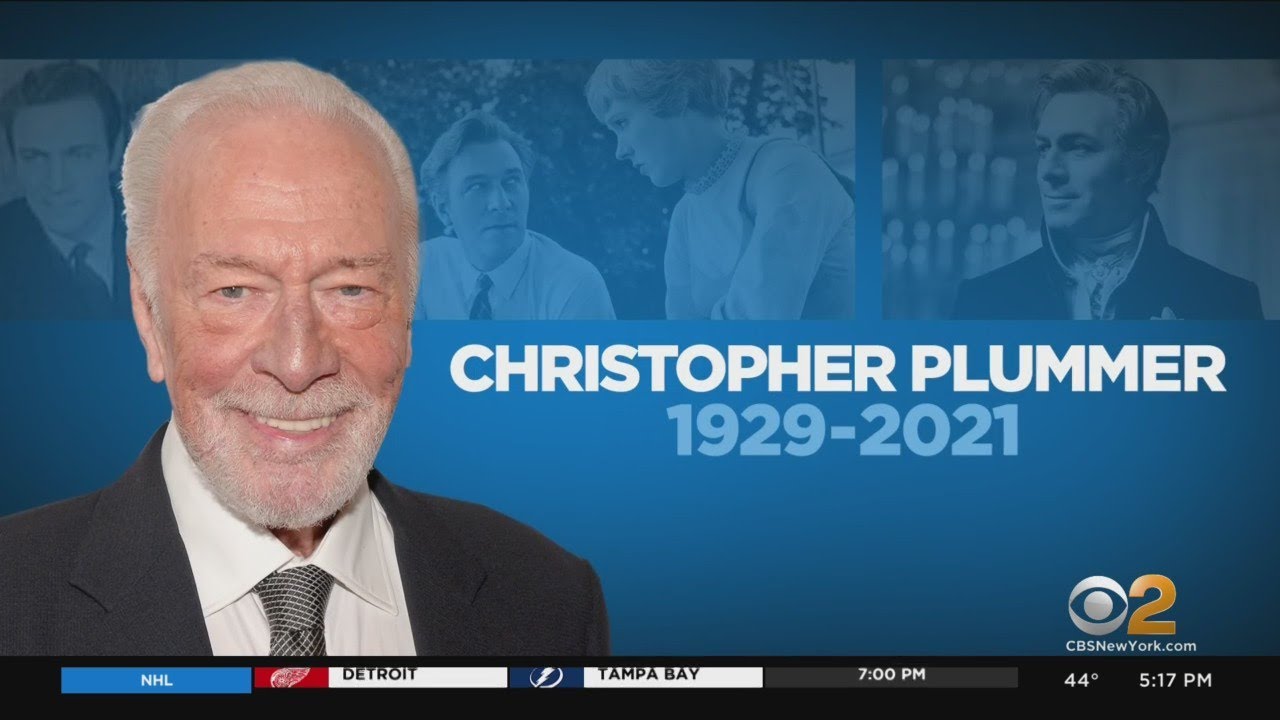Christopher Plummer bio on Wikipedia
Arthur Christopher Orme Plummer CC (December 13, 1929 – February 5, 2021) was a Canadian actor. His career spanned seven decades, gaining recognition for his performances in film, television, and theatre. Plummer made his Broadway debut in 1954 and continued to act in leading roles on stage, playing Cyrano de Bergerac in Cyrano (1974), Iago in Othello, and playing the titular roles in Macbeth, King Lear, and Barrymore. Plummer also performed in stage productions J.B., No Man’s Land, and Inherit the Wind.
According to Plummer’s wife, actress Elaine Plummer, he died “quite peacefully” at his home in Connecticut Friday morning after suffering a fall two and a half weeks ago. She added, “It’s so sad, but he had a great life,” she told The Canadian Press by phone. Elaine said her husband had a fall, hit his head against her car, and then took him to the hospital. She said it was a horrible accident. “He fought the good fight,” she added.
Christopher Plummer was born in Toronto and grew up in Senneville, Quebec. After appearing on stage, he made his film debut in Sidney Lumet‘s Stage Struck (1958). He won great acclaim with audiences for his performance as Captain Georg von Trapp in the musical film The Sound of Music (1965) alongside Julie Andrews.
Plummer portrayed numerous major historical figures, including Roman emperor Commodus in The Fall of the Roman Empire (1964), Arthur Wellesley, 1st Duke of Wellington in Waterloo (1970), Rudyard Kipling in The Man Who Would Be King (1975), Mike Wallace in The Insider (1999), Leo Tolstoy in The Last Station (2009), Kaiser Wilhelm II in The Exception (2016), and J. Paul Getty in All the Money in the World (2017). Plummer also appeared in such films as Spike Lee‘s Malcolm X (1992), Ron Howard‘s A Beautiful Mind (2001), Terrence Malick‘s The New World (2005), David Fincher‘s The Girl with the Dragon Tattoo (2011), Mike Mills‘s Beginners (2011), Rian Johnson‘s Knives Out (2019), and Todd Robinson‘s The Last Full Measure (2019).
Plummer received various accolades for his work, including an Academy Award, two Primetime Emmy Awards, two Tony Awards, a Golden Globe Award, a Screen Actors Guild Award, and a British Academy Film Award. He is one of the few performers who received the Triple Crown of Acting and the only Canadian. He won the Academy Award for Best Supporting Actor at the age of 82 for Beginners (2010), becoming the oldest person to win an acting award, and he received a nomination at the age of 88 for All the Money in the World, making him the oldest person to be nominated in an acting category.
As found on Youtube | More actors death
The superstar was supposed to start working on a “King Lear” film with Ontario-raised director Des McAnuff.
Recently he starred in the Toronto-shot television series “Departure,” which began production on its second season last fall, with Plummer shooting scenes from his home, taking COVID-19 precautions.
Gordon Pinsent, a veteran Canadian actor of the same generation, said Plummer’s “likability” was unflagging, as was his drive to continue performing into his twilight years.
“It must have seemed very much like a game at this stage in his life to continue adding yet another accomplishment,” said Pinsent, a Stratford Festival colleague of Plummer’s.
“He wanted to cover the entire baseball diamond of show business.”
Pinsent said Plummer gave the impression that “the road is wide and the work is plentiful” for veteran actors.
“(It was) certainly enough to keep him busy for as long as he wanted,” he added.
“He simply would continue to turn out the good ones, and boy, he did.”
The actor went through a particularly fertile creative period in his golden years, receiving his first Academy Award at age 82 for his supporting turn as a widower who embraces life as a gay man in “Beginners.” The trophy made him the oldest-ever Oscar winner in an acting category.
“You’re only two years older than me darling, where have you been all my life?” Plummer said as he accepted the statuette in 2012.
The Oscar came just two years after Christopher Plummer received his first Academy Award nomination for playing Russian writer Leo Tolstoy in “The Last Station.”

He also received a nomination in the supporting actor category in 2018 for “All The Money In The World,” a mere month after he’d replaced Kevin Spacey as billionaire J. Paul Getty in Ridley Scott’s biographical drama. Spacey was abruptly cut from the film in the wake of sexual assault allegations.
The “All the Money in the World” situation made Plummer a social media sensation, with fans heralding him for stepping in at the last minute.
The more mature he got, the more the scripts improved, and the more he learned about his craft, said Plummer, who scoffed at the word “retire.”
“If you love your work, which I do — and I’ve grown to love it more and more as I get older and realize that I’ve got to cram a lot in before I croak — I wouldn’t think of stopping,” Plummer told The Canadian Press in December 2010.
Christopher Orme Plummer was born in Toronto in 1929 into a notable family.
His great-grandfather on his mother’s side was Prime Minister John Abbott. His parents divorced when he was a baby, and his mother’s family raised Christopher Plummer in Montreal, where he became acquainted with the arts.
One of his school classmates was Oscar Peterson, who went on to become a Canadian jazz legend. He also developed a love of classic literature through childhood reading sessions with his family.
Plummer acted with the Montreal Repertory Theatre and made his professional debut in 1948 with Ottawa’s Stage Society, which later became the Canadian Repertory Theatre. He also worked at the CBC, in radio and television.
By his early 20s, he was already touring the U.S. in plays. His Broadway debut came in 1954’s “The Starcross Story.” That was promptly followed by his film debut, Sidney Lumet’s “Stage Struck.”
Plummer made his debut at Ontario’s Stratford Festival in 1956, playing Henry V. It was one of the most exciting theatrical experiences he’d ever had. He once told The Canadian Press, and it was at a festival he came to regard as a second home of sorts.
But it was in 1965, with the release of “The Sound of Music,” that Plummer would become forever known to moviegoers as a crusty Austrian widower whose frosty heart is melted by a young nun-turned-governess hired to care for his children.
Of course, the film has become a classic, but Christopher Plummer expressed disdain for the production, calling it “The Sound of Mucus.” He was careful to add, however, that he had “terrific memories” of making the movie and forged a lifelong friendship with co-star Julie Andrews (he once said that working with her was like “getting hit over the head with a Valentine”).
He continued varied work throughout the 1970s, including “The Return of the Pink Panther” and “The Man Who Would Be King,” and played Sherlock Holmes in “Murder by Decree.”
One of his best-known roles in the 1980s came on television when he played Archbishop Vittorio Contini-Verghese in the miniseries “The Thorn Birds.”
Christopher Plummer worked steadily in the 1990s in films including “Star Trek VI: The Undiscovered Country” and “Dolores Claiborne.”
In 1999, he was lavished with critical praise for portraying journalist Mike Wallace in Michael Mann’s “The Insider” alongside Al Pacino and Russell Crowe.
He was married three times. In the 1950s, his first marriage to actress Tammy Grimes produced a daughter, Amanda, an accomplished actor whose film credits include “Pulp Fiction.” He married and divorced again in the 1960s — his second wife was journalist Patricia Lewis. Christopher Plummer married dancer/actress Elaine Regina Taylor in 1970.
And despite splitting his time between Palm Beach, Fla., and Connecticut, he never forgot his Canadian roots.
In 2002 he appeared in Toronto director Atom Egoyan’s film “Ararat.” In 2007 he did “Emotional Arithmetic,” based on a novel by Canadian author Matt Cohen and shot in Quebec. And in 2019, he shot the first season of “Departure” in Toronto.
The late actor Christopher Plummer frequently spoke of his love of theatre and the thrill of performing in front of a live audience.
The actor returned to Stratford numerous times, including in 2008, to play the lead role in Bernard Shaw’s “Caesar and Cleopatra.”
His other memorable roles include industrialist Henrik Vanger in 2011’s “The Girl With the Dragon Tattoo” and the patriarch in the 2019 murder mystery “Knives Out.”
“You’ve got to keep going,” he told The Canadian Press in February 2010 when asked about his busy schedule. “I’m very happy that I seem to be getting more work as I get older. I seem to be doing more than less, which is fabulous because it keeps one young.”
The “celebrity” portion of his job, however, was not something he enjoyed. Plummer’s first trip to the Oscars was in 2010.
“I’m not crazy about (the fanfare). It’s a business, you know, it’s a flesh-peddling business, and always I wouldn’t say I like the feeling on the red carpet. You feel like you’re pushing yourself, which I don’t do.”
And yet, he seemed to revel at the moment as he received an armful of trophies for his role in “Beginners,” culminating in the Oscar.
“I have a confession to make. When I first emerged from my mother’s womb, I was already rehearsing my Academy thank-you speech,” he said onstage at the awards show. “But it was so long ago, mercifully for you, I’ve forgotten it. But I haven’t forgotten who to thank.”
He expressed gratitude to his family, his fellow nominees, “Beginners” director Mike Mills and co-star Ewan McGregor.
In addition to the Oscar, Christopher Plummer was a companion of Canada’s Order and a recipient of the Governor General’s Lifetime Achievement Award. He also won two Tonys, two Emmys, and a Genie.
For all of his success, the on-set nerves never went away, he admitted.
“I usually walk on terrified that I’m going not to make it through the first take,” Plummer told The Canadian Press in January 2020.
“Without jitters, you’re no good; you’d be terrible. They supply all sorts of different colors.”







